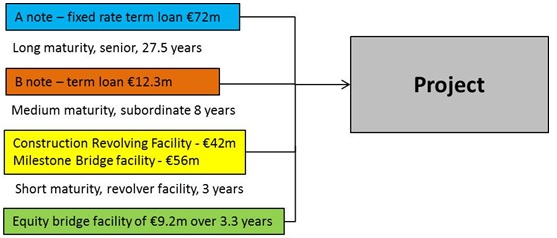Zaanstad Prison PPP, The Netherlands
The Dutch government reached successful financial close on the Zaanstad Prison PPP in October using ING and NIBC's Pebble-Commute financing structure, once again confirming that the country is at the forefront of employing new innovative financing solutions for its projects.
The deal will hopefully provide both the Pebble promoters and the rest of the European infrastructure market with a good template to follow in future. It also gives impetus to institutional investors who continue to explore the infrastructure market in search of long term investment opportunities.
Project Background
Zaanstad Prison PPP is one of the few justice sector PPPs that the Netherlands has procured in recent times. The project has had a dotted history since it was first announced back in 2008. It suffered delays during 2011-2012, along with many other social infrastructure projects, due to government budget cuts which set project timetables back by many months.
Finally, after being brought back on track earlier this year, the project authority proceeded to select a preferred bidder for the project from the final two bidders - BAM PPP and Ballast Nedam. Ballast Nedam along with consortium member Imtech clinched the deal to be named preferred bidder in July and within two months of that the government, sponsors and financiers brought the project to financial close.
The Pebble product wasn't the first and only solution that the project sponsors and authority were considering; back in May 2013 sources had told IJ News that both final bidders were being supported by banks in their bids with an aim to provide long-tenor debt. However eventually the project witnessed enough interest from both institutional investors and banks, this made its final choice for the Pebble-Commute an obvious one.
Innovative Financing
The financing of the Zaanstad Prison project is what makes this a unique deal for the European infrastructure finance market. The deal was the first to be closed using the Pebble-Commute financing structure from Dutch banks ING and NIBC.
The Pebble-Commute structure is a derivative of the Pebble format launched into the market by ING in early 2012; designed to be an open format long-term project financing tool.
The product provides a standard process for project sponsors and procuring authorities looking to secure long term financing for their projects from non-conventional sources, and sees bank lenders and institutional financiers providing a combined financing solution. Financing is split into a long term senior A note and a subordinated, short term B note. The Pebble-Commute structure which has been adopted for this deal differs slightly from the pure Pebble structure in so much as the B loan will be paid upfront rather than funded incrementally through construction.
The standard Pebble structure also uses a vehicle to deploy capital to a project, but with the Zaanstad Prison project the capital was deployed directly into the project company. Bankers working on the deal cited the relatively small size of the deal as a reason for this.
The total debt facility for the project is around €195 million (US$262m) and is split as follows:
ING and NIBC will provide the short term B note. The B loan will operate as a first loss first pay subordinate facility and has a tenor of eight years. The B Loan helps to enhance the rating of the A note, which makes it more favourable for institutional investors to fund.
Meanwhile the A loan will be provided by long term institutional investors, from the Netherlands, Belgium, France and Germany with a tenor of 27.5 years. The A loan is “pure” long term money with no cash sweep or margin step ups. It carries a fixed rate coupon and benefits from prepayment protection. Pricing on the A note is understood to be above 200bps. DekaBank has taken a €30 million ticket on behalf of an institutional investor in the A note.
ING and NIBC will also provide a Construction Revolving Facility of €42 million over three years, a Milestone Bridge Facility of €56 million over three years and an equity bridge facility of €9.2 million over 3.3 years.
Sponsors Ballast Nedam (65 per cent) and Imtech (35 per cent) will provide equity of €105 million to the project.
Once complete, the Zaanstad Prison will accommodate over 1,000 detainees. The institution will serve initially as both a detention centre and prison. The prison will be multifunctional and the cells suitable for multiple occupancy. The prison is scheduled to open in 2016.
Future financings
As alluded to earlier, the Dutch infrastructure market has never shyed away from trying new and innovative models of financing. The country still has a steady pipeline of projects and it is hoped that Zaanstad's financing structure will be replicated in the future.
Banks, pension funds and other institutional investors have long expressed the desire to work alongside one another and products like Pebble-Commute provide a platform to make that possible. Bank pricing pressures and fewer long-term debt providers makes it that much more important for the infrastructure market globally to open its mind to new financing products and structures.
Request a Demo
Interested in IJGlobal? Request a demo to discuss a trial with a member of our team. Talk to the team to explore the value of our asset and transaction databases, our market-leading news, league tables and much more.
